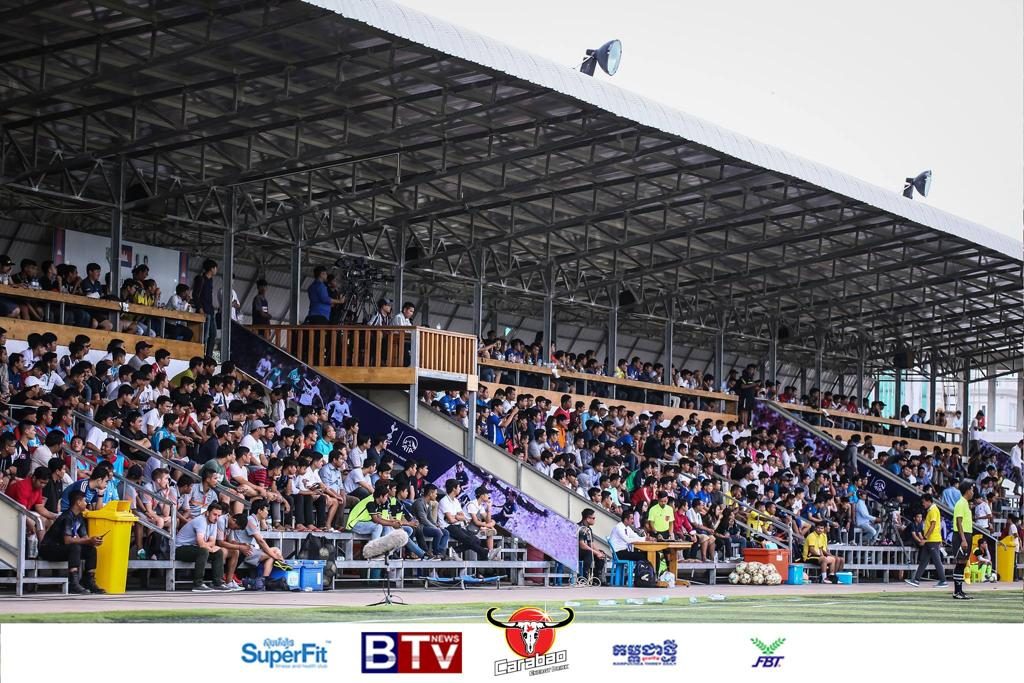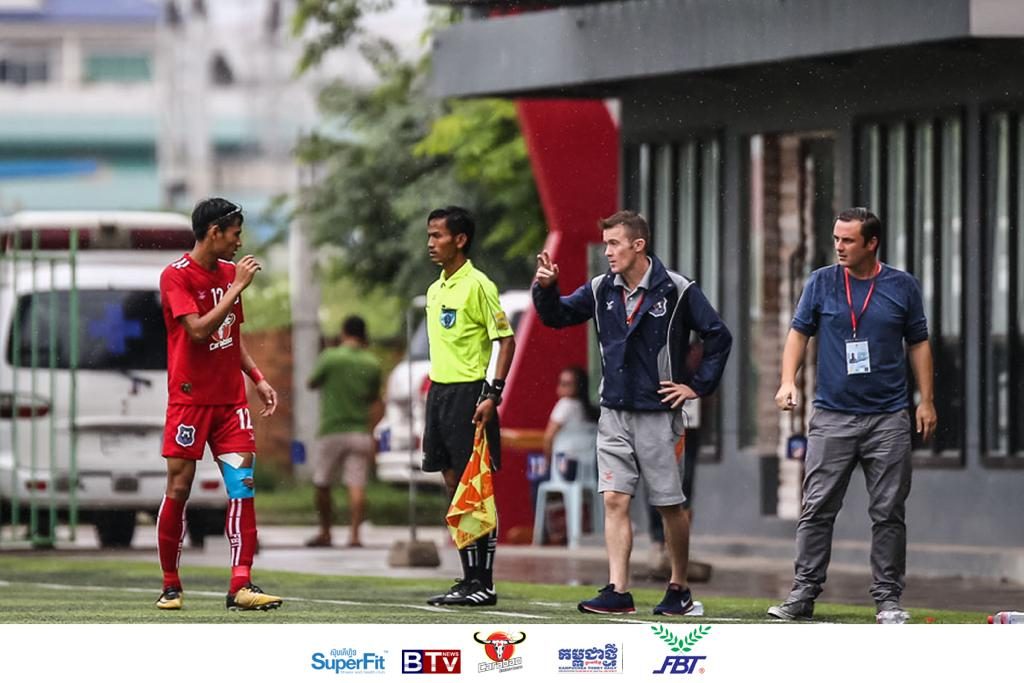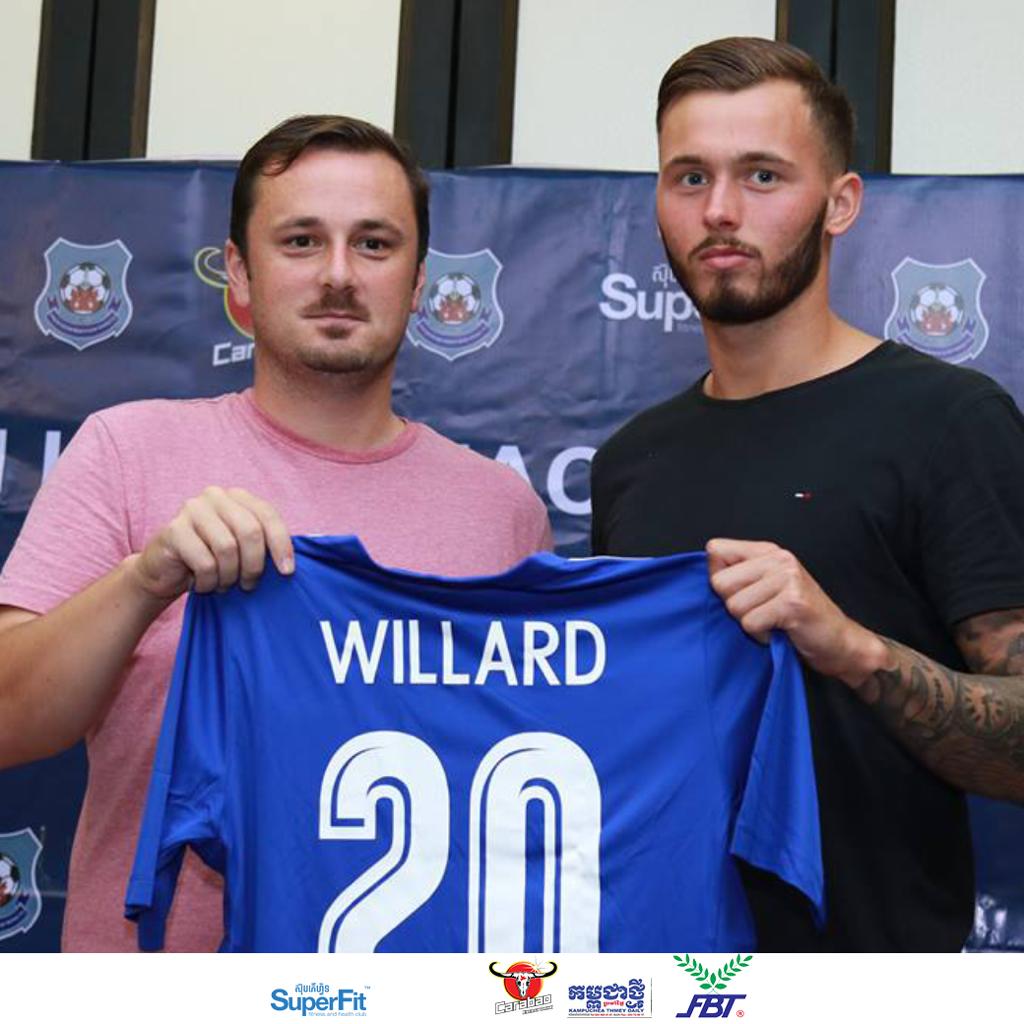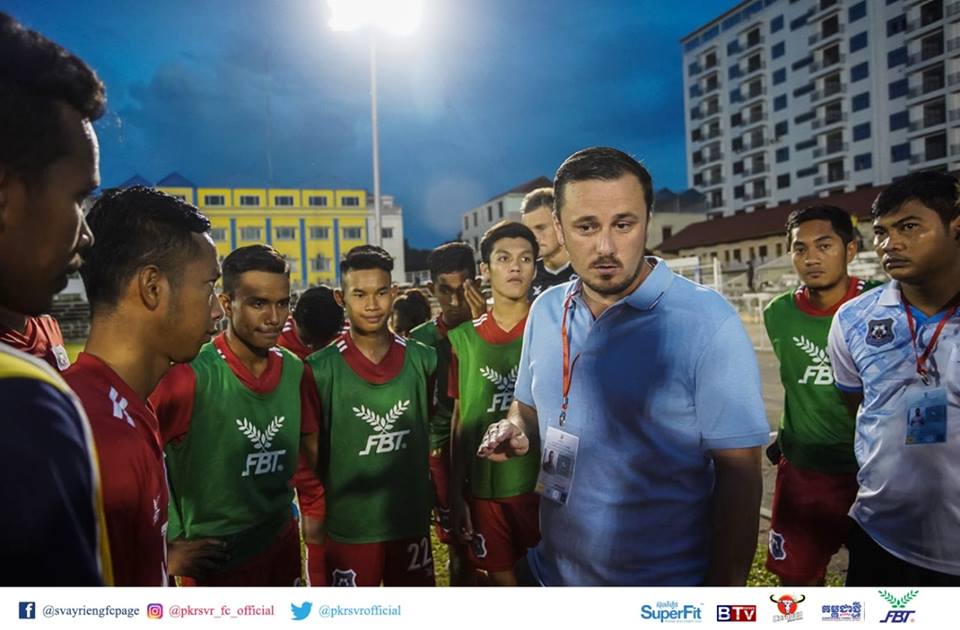Riots, missing players and limes — The story of the Irishman taking on the Cambodian League
For many, travelling around Australia is all about discovery. For Conor Nestor though, he discovered far more than the cheapest bars and the best places to get a tan.
The Limerick native took off on this around-the-world trip shortly after leaving his role as Development Officer for the FAI, citing a desire to experience more hands-on coaching.
After three months travelling in the US and Melbourne, he was offered a job in Cambodia coaching children in international schools as he sought a sponsor to return to Australia.
From here, he began a whirlwind journey which saw him appointed manager of Preah Khan Reach Svay Rieng FC in the C-League via a spell managing in the semi-professional third tier.
Nestor was struck straight away by the passion for football among the Cambodian people. Svay Rieng attract crowds of between 3,000 and 5,000, while the national team — currently ranked 172nd and managed by Keisuke Honda — can draw crowds of up to 50,000.
“Football is in the blood of the people. Every street you turn down you see someone wearing a football jersey. It might be Dortmund, Manchester United or Juventus, but equally, it might be Svay Rieng or the national team,” Nestor told the Sports Gazette.

Based in Svay Rieng, on the Vietnamese border, Nestor’s new club finished as runners-up in the 2017 season and made the semi-finals of the Championship play-offs, but affairs were far from smooth off the pitch.
“The club was staffed, but there was very little structure. There was no one at the club with a sports science degree. I found out from the medical department that we had no records kept of past injuries and treatments.
“I was being told had players had flown back from Thailand having been operated on, but there was no information on what was operated on and how long they’d be out for.
“As part of my interview, I had to give a presentation to the chairman. I put across my five-year aim, which was to grow the club make it more sustainable, improve the fitness department and the links to the academy.
“One positive was the club already had a good academy structure. There is a history of producing their own players, many of the current players have been with the club since they were young boys.
“There are comparisons with Southampton. If there is a promising young left back coming through for example, the club will not buy a back-up left back.
“This was part of the reason I took the gamble, 12 of them were playing for the national team as well.”
Having assessed the nature of the challenge, attention turned to the practicalities of a job so far out of the comfort zone of a European coach.
“Getting my message across proved difficult in the first few weeks given the vagueness of the Khmer language.
“As my first translator explained to me over a beer, one example is that there is no separate word for lemons and limes. The way you’d distinguish between the two is to say the green one or the yellow one. I began to realise that direct translation was difficult and my messages were not getting through.
“So, at Svay Reing, I brought in a fellow Irishman who had played for me at at ISI Group United, who has been here for 13 years and speaks Khmer fluently. This helped a lot and he was able to point out any red flags.
“I found the Cambodians to be really technical footballers that love the ball, can use the ball and are really receptive tactically, but general fitness and concentration are lacking.
“The Cambodians are not physically dominant people, there are not usually many players over six foot. The aim of my team is to dominate the ball, press high and win the ball back quickly.”

The lack of fitness perhaps stems from the disorganisation of grassroots Cambodian football. Below the second tier, there is no organised league system with the leagues that do exist sponsored by companies. As well as this, there are no foundation courses for coaches, badges instead start at Level C, much to Nestor’s frustration.
“Often you find players have missed vital coaching. You find yourself coaching basics when you don’t have the time for it at this level and you get some players that may have missed the window to learn.”
Despite all of this, things began well for Svay Rieng. They sat fifth after seven matches and were well in the chasing pack, but Nestor could scarcely have believed what was to happen in their next fixture at home to army sponsored Ministry of National Defence FC.
In a cruel blow, Svay Rieng conceded after 16 of 22 additional minutes to lose 2-1, but as if things weren’t bad enough, an over-the-top challenge from Nub Tola started a brawl, which turned into a riot and ended in opposing players being chased into the stands and set upon by both fans and players.
The following days saw seven of the squad, including both goalkeepers, suspended as Nestor’s small squad — already hit by two-long injuries and the departure of captain Prak Mony Udom to Malaysia’s Negeri Sembilan — was seriously depleted.
“I was in absolute shock, all I could do was just stand there on the touchline, it was like it was a hidden camera show. Unfortunately, it is common place in Southeast Asia.”
In September, Indonesia’s Liga 1 was suspended after a 16th death in the space of eight months was recorded at a match.
“Moving forward, it allowed me to gain a better understanding of the temperament of the players and we were able to set disciplinary proceedings and boundaries in place going forwards.”
Even so, the problem of remaining competitive became an issue and Nestor had to dip into the transfer market.
“It’s tough, you find yourself awake at 5am speaking to Brazil and you rely a lot on agents alone. We looked mostly in Scandinavia and Australia.”

It was in the Swedish fourth-tier the club found former Southampton youngster Harley Willard playing for Hӓsselholms and offered him the chance to become the first Englishman to play in Cambodia.
“The biggest change for him was the transition from part time to full time football. It took him two months to acclimatise, mostly we were just putting cold towels on his head to try and cool him down.
“It’s fine for Pep Guardiola playing his all-action football in the cool weather of England, but here we’re playing in the middle of the day in over 30° heat.
“We were really pleased with Harley, the fans were too and he has improved a lot here. He even got offered the opportunity to move up to the second tier in Sweden, but turned it down, saying he wanted to stay here.”
Svay Rieng fought on and ended the season sixth in the 12-team league, but there were positive signs as the last three matches — which saw the return of the suspended players — yielded three victories.
Heading into the new season, which begins in March, Nestor remains as committed as ever to the project and is feeling at home in his surroundings.
“For sure it has been a culture shock, but there is a good expat community and you couldn’t meet a nicer people. There is a warmth to them and that was my driving force in staying, but I wouldn’t have stayed unless I felt there was something here.
“This may sound crazy, but in many ways, it feels like Ireland in the late 1980s. We were one of the poorest countries in Europe at that time, self esteem was low. Ireland’s performance in the 1990 World Cup was a tipping point for a whole nation that would go on to become one of the world’s most successful small countries in the 90s.
“Cambodia has had a tragic recent past an is in need of a lift, for many people it is their love of the game.”
Preparations took an early setback when the club’s second English player, Harvey Read, left without kicking a ball, insisting that he did not like it out in Asia.
He has since been replaced by American Johnny Campbell who has joined from Phnom Penh Crown and now newly promoted Visakha have caused a stir with their spending.
“It’s going to be tough, Visakha have thrown a bomb into the transfer market. Imagine a club being promoted from the Championship being owned by Roman Abramovich and throwing money around. They’ve invested heavily in local players, which is unusual as local players don’t really move around in Cambodia.
“We will not compete with that, we refuse to. We have a budget for a reason and we will probably have to compete above our level, but we need to be in that pack challenging for the league title and trying to win the domestic cup. Fourth would be a failure.”
As for the future development in the country, Nestor insists that there is plenty more to come.

“This is a very interesting place to be, there is so much happening. It can be a shop window for players to earn themselves a move to Thailand, Indonesia or Malaysia where they can earn six figure sums and play in front of full stadiums.
“The sport is catching fire here massively, there is similar potential to in Thailand which is around 15 years ahead in its development.
“Considering only 0.001% of players trying to make it Europe will actually reach the professional game, coming out here could be an opportunity for them to face less competition.
“So long as they’re prepared to put up with the bad pitches, questionable referees, climate and food, which can be very different from back home.”
Featured photograph/Conor Nestor